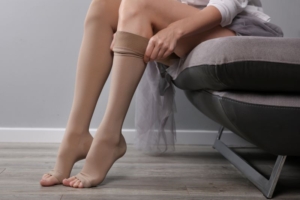Compression socks, also known as compression stockings, are specialized socks that apply gentle pressure throughout the legs and ankles.
To avoid further complications and/or side effects, anyone who has been prescribed compression socks – or is interested in starting to wear them – should be aware of the best practices for their ongoing use and care.
Best Practices for Wearing Compression Socks

- Your compression socks should be fitted by a professional so they fit properly.
- Make sure you are ALWAYS wearing the correct size, so get fitted again if you:
- Gain or lose weight
- Started with severe swelling that is getting better with swelling reduction efforts
- Check your skin for changes like redness, dents, dryness, and chafing between every wear.
- Take your compression socks off every day and replace with a clean, dry pair so that the socks don’t adhere to your skin and become difficult to remove.
- If wounds develop, see your vein care specialist as you might need care like an “Unna’s boot” until the skin has closed again.
Best Practices for Caring for Compression Socks
When properly cared for, most compression socks that are worn and washed daily will last approximately 6 months. To get the most out of your compression socks:
- Follow instructions from sock or stocking manufacturers and your healthcare provider, including guidelines for hand-washing compression socks and hang-drying them to prevent warping or changes in the fabric.
- Wash compression socks after every wear to restore the elastic properties and prevent oils, skin cells, or bacteria from accumulating in the fabric.
- Avoid wearing creams, lotions, or oils while wearing your compression socks.
- Dispose of compression socks and replace them as soon as you notice them losing their stretch.
Getting Started with Compression Stockings?
It’s important to use the right compression therapy options for your particular condition. While it’s possible to purchase light-support compression stockings on your own, it’s much better to get socks fitted by a certified vein specialist or stocking fitter.
If you’re in the Pacific Northwest, our doctors at Inovia Vein Specialty Centers would be happy to guide you along your compression therapy journey! Give us a call at 1-800-VEIN-DOC or book a consultation online today.